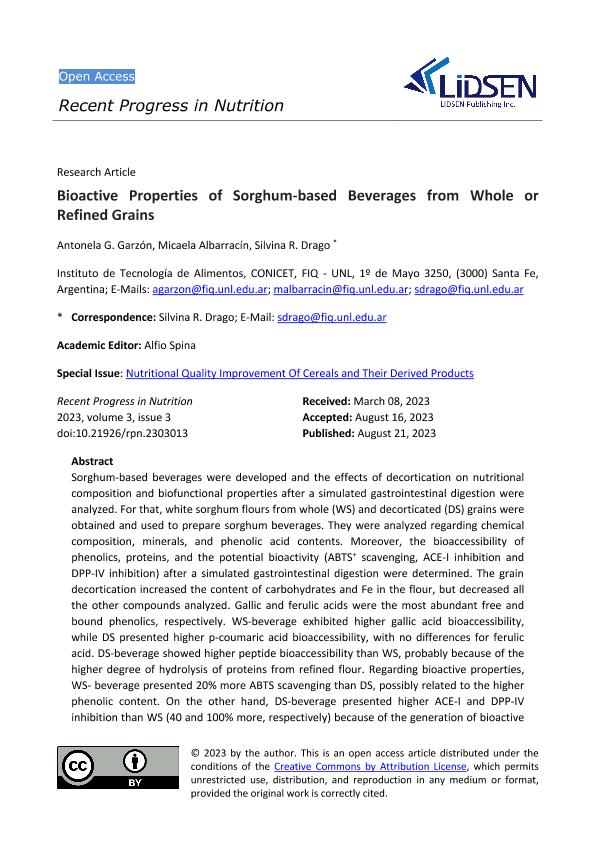Mostrar el registro sencillo del ítem
dc.contributor.author
Garzón, Antonela Guadalupe

dc.contributor.author
Albarracín, Micaela

dc.contributor.author
Drago, Silvina Rosa

dc.date.available
2024-01-08T14:25:59Z
dc.date.issued
2023-08
dc.identifier.citation
Garzón, Antonela Guadalupe; Albarracín, Micaela; Drago, Silvina Rosa; Bioactive properties of sorghum-based beverages from whole or refined grains; Lidsen Publishing Inc.; Recent Progress in Nutrition; 03; 03; 8-2023; 1-15
dc.identifier.issn
2771-9871
dc.identifier.uri
http://hdl.handle.net/11336/222821
dc.description.abstract
Sorghum-based beverages were developed and the effects of decortication on nutritional composition and biofunctional properties after a simulated gastrointestinal digestion were analyzed. For that, white sorghum flours from whole (WS) and decorticated (DS) grains were obtained and used to prepare sorghum beverages. They were analyzed regarding chemical composition, minerals, and phenolic acid contents. Moreover, the bioaccessibility of phenolics, proteins, and the potential bioactivity (ABTS+ scavenging, ACE-I inhibition and DPP-IV inhibition) after a simulated gastrointestinal digestion were determined. The grain decortication increased the content of carbohydrates and Fe in the flour, but decreased all the other compounds analyzed. Gallic and ferulic acids were the most abundant free and bound phenolics, respectively. WS-beverage exhibited higher gallic acid bioaccessibility, while DS presented higher p-coumaric acid bioaccessibility, with no differences for ferulic acid. DS-beverage showed higher peptide bioaccessibility than WS, probably because of the higher degree of hydrolysis of proteins from refined flour. Regarding bioactive properties, WS- beverage presented 20% more ABTS scavenging than DS, possibly related to the higher phenolic content. On the other hand, DS-beverage presented higher ACE-I and DPP-IV inhibition than WS (40 and 100% more, respectively) because of the generation of bioactive peptides. Whole or refined sorghum could be used to produce beverages analogs to milk, with health potential benefits.
dc.format
application/pdf
dc.language.iso
eng
dc.publisher
Lidsen Publishing Inc.
dc.rights
info:eu-repo/semantics/openAccess
dc.rights.uri
https://creativecommons.org/licenses/by/2.5/ar/
dc.subject
SORGHUM
dc.subject
PHENOLIC COMPOUNDS
dc.subject
BIOACTIVE PEPTIDES
dc.subject
BIOACCESIBILITY
dc.subject
PLANT-BASED BEVERAGES
dc.subject.classification
Alimentos y Bebidas

dc.subject.classification
Otras Ingenierías y Tecnologías

dc.subject.classification
INGENIERÍAS Y TECNOLOGÍAS

dc.title
Bioactive properties of sorghum-based beverages from whole or refined grains
dc.type
info:eu-repo/semantics/article
dc.type
info:ar-repo/semantics/artículo
dc.type
info:eu-repo/semantics/publishedVersion
dc.date.updated
2024-01-05T12:11:25Z
dc.journal.volume
03
dc.journal.number
03
dc.journal.pagination
1-15
dc.journal.pais
Estados Unidos

dc.journal.ciudad
Beachwood
dc.description.fil
Fil: Garzón, Antonela Guadalupe. Consejo Nacional de Investigaciones Científicas y Técnicas; Argentina. Universidad Nacional del Litoral. Facultad de Ingeniería Química. Instituto de Tecnología de los Alimentos; Argentina
dc.description.fil
Fil: Albarracín, Micaela. Consejo Nacional de Investigaciones Científicas y Técnicas; Argentina. Universidad Nacional del Litoral. Facultad de Ingeniería Química. Instituto de Tecnología de los Alimentos; Argentina
dc.description.fil
Fil: Drago, Silvina Rosa. Universidad Nacional del Litoral. Facultad de Ingeniería Química. Instituto de Tecnología de los Alimentos; Argentina. Consejo Nacional de Investigaciones Científicas y Técnicas; Argentina
dc.journal.title
Recent Progress in Nutrition
dc.relation.alternativeid
info:eu-repo/semantics/altIdentifier/doi/http://dx.doi.org/10.21926/rpn.2303013
dc.relation.alternativeid
info:eu-repo/semantics/altIdentifier/url/https://www.lidsen.com/journals/rpn/rpn-03-03-013
Archivos asociados
